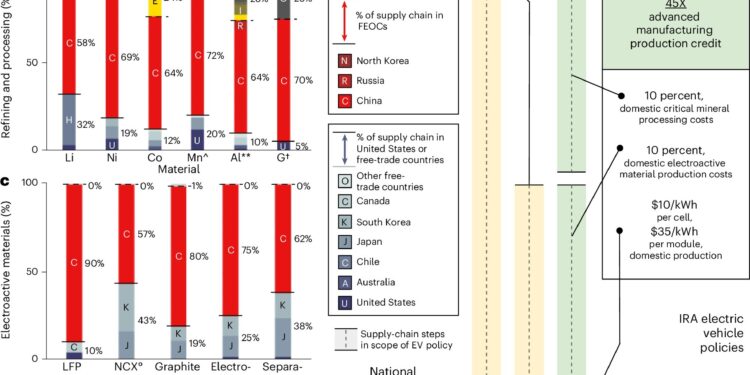The geographic distribution of national production for each stage of the electric vehicle battery supply chain. Credit: Natural energy (2024). DOI: 10.1038/s41560-024-01649-w
Vehicle electrification is an important path to reducing global greenhouse gas emissions. The supply chain for electric vehicle battery materials is heavily dependent on China, a dependence that can leave the United States vulnerable to supply chain disruptions and geopolitical shifts. The Inflation Reduction Act (IRA) provides significant incentives for U.S. battery construction and supply chain diversification, but some gaps exist.
A recent study by researchers at Carnegie Mellon University’s College of Engineering analyzed the likely impact of IRA on incentivizing vehicle electrification and reducing supply chain vulnerabilities. Anthony Cheng, Ph.D. student in Engineering and Public Policy (EPP); Erica Fuchs, professor at EPP; and Jeremy Michalek, professor of PPE and mechanical engineering and director of Carnegie Mellon’s Vehicle Electrification Group, contributed to this research.
The results are published in the journal Natural energy.
The total credits offered by the IRA would allow a manufacturer to receive tax credits greater than the total cost of producing the batteries, but it would be difficult to qualify for all of the credits, Michalek explained.
In particular, the 30D Clean New Vehicle Credit, which offers $7,500, can only be claimed on vehicles with U.S.-designated “foreign entities of concern” – including China, Russia, Iran and North Korea – played no role in the supply chain. , Michalek said.
In a related study earlier this year, EPP researchers analyzed the extent to which electric vehicle supply chains are vulnerable to disruption, with a focus on China. This study found that for virtually all chemicals, the entire supply chain would be profoundly affected if Chinese exports were disrupted.
At the same time, another recent study by EPP researchers found that electric vehicle manufacturing boosts the job market because these vehicles require more jobs per vehicle produced than their conventional counterparts.
The new 30D credit provides a major incentive for U.S. and allied automakers to focus on their own means of production and find ways to develop alternatives to Chinese materials in the supply chain, Michalek explained.
There is, however, a major loophole in that the restriction on materials of Chinese origin only applies to vehicles sold. An automaker can avoid the restriction by leasing vehicles and instead claiming the 45W Own Vehicle Business Credit, which is currently worth the same amount as the 30D credit.
A supply chain’s flexibility to diversify does not always correspond to its credit eligibility. Notably, lithium iron phosphate batteries have more potential to reduce supply chain vulnerabilities and are eligible for incentives, but they have more limited total incentives than nickel and cobalt-based batteries.
The study found that the IRA mainly encourages diversification of downstream battery manufacturing, while the impact on upstream supply will depend on how automakers respond to foreign entities of concern and leasing rules .
If enough automakers succeed in moving toward a more leasing-heavy business model to get around the restrictions, the policy may need to evolve to remain effective, Michalek said, noting that Carnegie Mellon researchers will continue to monitor impact and results.
More information:
Anthony L. Cheng et al, US industrial policy could reduce electric vehicle battery supply chain vulnerabilities and influence technology choice, Natural energy (2024). DOI: 10.1038/s41560-024-01649-w
Provided by the Department of Engineering and Public Policy at Carnegie Mellon University
Quote: US industrial policy could strengthen the electric vehicle battery supply chain (October 7, 2024) retrieved October 7, 2024 from
This document is subject to copyright. Except for fair use for private study or research purposes, no part may be reproduced without written permission. The content is provided for informational purposes only.



